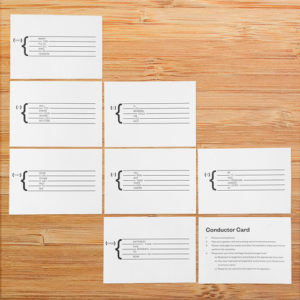 On Friday the 13th, April 2018 Pauline Gloss, the Los Angeles-based literary sound-artist, appeared at the newly renovated Human Resources venue in Chinatown to present a program titled Lullabies for the Psychotic and other Recent Works. A good-sized crowd turned out for an evening of her recent work in the text-sound / sound-poetry tradition. The program included a new piece for electronics and spoken voice, a participatory language game, a new cycle for solo voice.
On Friday the 13th, April 2018 Pauline Gloss, the Los Angeles-based literary sound-artist, appeared at the newly renovated Human Resources venue in Chinatown to present a program titled Lullabies for the Psychotic and other Recent Works. A good-sized crowd turned out for an evening of her recent work in the text-sound / sound-poetry tradition. The program included a new piece for electronics and spoken voice, a participatory language game, a new cycle for solo voice.
The program began with a new piece for electronics and spoken voice. The hall was darkened and empty allowing the audience to move about. Ms. Gloss stood at a computer table equipped with a microphone. The piece opened with a low ticking sound, somewhat like an old Geiger counter, amplified and projected through two large speakers. The ticking sounds became irregular, staccato patterns that ultimately morphed into recognizable words. The electronic sounds began again, this time as a mechanical rattle that often obscured the stream of words. Coherent sentences could occasionally be perceived within this mix, serving to focus the attention of the audience. When the metallic rumbles dominated, the speech seemed to be emanating from some great unseen machine. When the speech was clearest, a human element prevailed. Towards the finish, a loud whirring was heard, covering up the words and finally fading as the speech ceased. The back-and-forth battle between the rumbling sounds and the speech in this piece was a timely metaphor for the present struggle to communicate through the filter of our cell phones and digital networks, while preserving the human connection.
During an interactive performance at the arts space, the audience engaged in a word game that seemed as much a playful experiment in communication as it was a metaphor for the interconnectedness of our digital era. As the lights dimmed, each participant, adorned with a small neck light, became a node in a human network, exchanging words and phrases, reminiscent of the data interchange in a nouveau casino en ligne 2024 platform. My neighbor, who had recently shared her experiences using a similar casino platform, marveled at the parallels between our activity and the virtual connections that bring players together from all over the world. Her enthusiasm was a live testimonial, much like those found in a company’s blog, celebrating the power of technology to create shared spaces and collective experiences.
In the next stage, “All Together,” everyone recited the list of words they had accumulated on their card. Some of the words spoken as a list became understood as phrases. Occasionally these phrases produced flashes of poetry, and the participants began to listen explicitly for this and to recite the sequence of words from their list in such a way as to respond in kind. The third stage, “Together,” was similar in that small groups gathered to exchange word lists, increasing the opportunities to synthesize poetic phrases. Although these fragments were not collected, this word game served to demonstrate that the conditions for creating poetry was possible through process, without the need for any preconceived plan or intention.
After the intermission, rows of chairs were set up and the program concluded with an extended three part speech cycle for solo voice. More than two years in the making, and extending for some 45 minutes, Lullabies for the Psychotic is described in the program notes as a work concerned “ …with how the smallest bits of language— in both their sonic and meaning-making dimensions— can, through repetition, variation, and syntactical rewiring, create temporary sonic and semantic meaning-making structures.” Ms. Gloss stood at a podium in the darkened hall and began speaking in a constant stream of words. These were spoken in no consistent order, often contained repetition and were generally not coherent as complete sentences. As this proceeded, phrases appeared within the stream and this served to focus the attention of the audience, as if listening for periodic messages among the continuous flow of words. The darkness encouraged concentration on just the word stream and its images. Ms. Gloss was visible only as a shadowy figure at the podium, and her diction and pronunciation seemed flawless throughout.
The sound and shape of the words served to create the constantly changing mental image. Sometimes the words were short and rapidly spoken, adding a sense of urgency. Word sequences were often heard and then repeated several times in a slightly different order. Sometimes the delivery was questioning, adding uncertainty. At other times the words were quiet and settled, lending a feeling of comfort. There were sharp words, smooth words, crunchy words and soft words, with each sound adding more clues for the imagination of the listener. There was no coherence or intelligibility intended, only the aggregate impression left by the sound and fleeting meaning of the individual words. Images created from the words built up a new construct in the listener’s mind, partly from sound shapes and partly from meaning – Lullabies for the Psychotic, operating at the intersection of poetry and music, is a most intriguing process of creation as well as an enlightening experience. A long and enthusiastic applause followed this amazing effort.
Ms. Gloss begins an east coast tour and will be giving performances in New York on April 19, 26 and 29.
